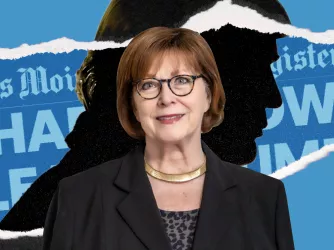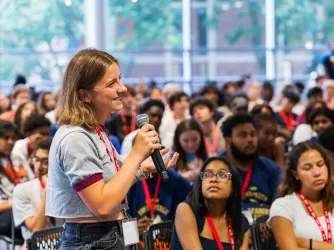Table of Contents
The United Nations is taking notice of academic freedom. FIRE is asking hundreds of colleges to do the same.

United Nations Headquarters in New York City. (Osugi/Shutterstock)
Today, FIRE wrote to more than 400 institutions to encourage them to take note of a new report on academic freedom released by the United Nations Office of the High Commissioner for Human Rights’ Special Rapporteur on the Promotion and Protection of the Right to Freedom of Opinion and Expression.
The report, which was written by former Special Rapporteur David Kaye and presented to the United Nations General Assembly on Oct. 23, 2020, by current mandate holder Irene Khan, presents a concerning picture of the global state of academic freedom.
FIRE’s letter today notifies universities of the report’s commentary on academic freedom in the United States as well as its recommendations for how institutions can better protect student and faculty rights on campus.
Citing FIRE, the Special Rapporteur asserts:
The willingness of universities to submit to public pressure can erode academic freedom and freedom of expression. In the United States of America, pressure from the public or from students has led to disciplinary reviews of academics, and in some instances, has even resulted in them being barred from campus. Broadly speaking, such a dynamic may lead to a culture of repression and self-censorship, where restrictive measures against academic staff are guided by outside pressure rather than academic achievements and activities.
This “willingness of universities to submit to public pressure” is an unfortunate trend FIRE has challenged at universities across the country. In recent months, we’ve seen a vast uptick in cases from students and faculty experiencing censorship. As the report explains, this willingness affects not only the community members who have been directly censored, but also their peers who may choose to remain silent rather than risk retaliation.
The report also explains that academic freedom should be broadly construed by universities, and warns institutions against punishing academics’ speech, whether it occurs on campus or on social media:
Individuals enjoy academic freedom not only within their institutions, in the internal aspects of research, scholarship, teaching, convenings and other on-campus activities, but also “extramurally”, in their role as educators and commentators outside the institution. For instance, an academic bringing her or his expertise to bear in a hearing before a legislature, a lecture to a community, a conversation on broadcast media or a post on social media should be understood as, inter alia, an exercise of academic freedom. In other words, that framework is not limited to the institutional environment. When an academic engages in expression outside of her or his academic topic – that is, not only outside the substantive area but also methodologically – she or he retains the right to freedom of expression guaranteed by human rights law, even if that engagement is not considered a part of her or his academic freedom. It should also be emphasized that academics should not be punished by their institutions for exercising their rights to freedom of expression, association and assembly and religious belief, among others.
Most critically, the Special Rapporteur ends the report by offering a number of recommendations for governments, universities, and other institutions to ensure the protection of academic freedom. The recommendations for academic institutions include:
(a) Respect the rights of all members of their communities, including faculty, students, researchers, staff, administrators and outsiders who participate in academic pursuits. That respect must include the right of all members to freedom of opinion and expression, including peaceful protest on academic premises;
(b) Ensure that members of academic communities have protection against coercion by third parties, whether the State or groups in society. This requires, in particular, institutions to stand up for members of their communities who face attack or restriction owing to the exercise of their academic freedom.
These are common sense recommendations that would allow universities to live up their existing obligations to freedom of expression, whether they come from the First Amendment at public universities or policy commitments to free expression at private universities.
As FIRE’s letter explains, we hope that U.S. institutions take the report’s valuable recommendations under consideration and incorporate them into their institution’s policies on academic freedom and freedom of expression and publicly commit to standing firm against pressure to censor.
We again thank the Special Rapporteur for bringing attention to this vital topic, and we stand ready to aid U.S. university leadership in their efforts to protect expressive freedoms on campus — whether those campuses are at home or abroad.
You can read FIRE's full letter here:
Recent Articles
FIRE’s award-winning Newsdesk covers the free speech news you need to stay informed.

FIRE’s defense of pollster J. Ann Selzer against Donald Trump’s lawsuit is First Amendment 101

Cosmetologists can’t shoot a gun? FIRE ‘blasts’ tech college for punishing student over target practice video

China’s censorship goes global — from secret police stations to video games
